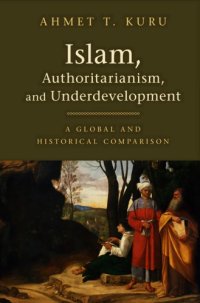
Ebook: Islam, Authoritarianism, and Underdevelopment: A Global and Historical Comparison
Author: Ahmet T. Kuru
- Genre: Other Social Sciences // Politics
- Tags: Islam Authoritarianism Underdevelopment
- Year: 2019
- Publisher: Cambridge University Press
- Language: English
- pdf
Why do Muslim-majority countries exhibit high levels of authoritarianism and low levels of socio-economic development in comparison to world averages? Ahmet Kuru criticizes explanations which point to Islam as the cause of this disparity, because Muslims were philosophically and socio-economically more developed than Western Europeans between the ninth and twelfth centuries. Nor was Western colonialism the cause: Muslims had already suffered political and socio-economic problems when colonization began. Kuru argues that Muslims had influential thinkers and merchants in their early history, when religious orthodoxy and military rule were prevalent in Europe. However, in the eleventh century, an alliance between orthodox Islamic scholars (the ulema) and military states began to emerge. This alliance gradually hindered intellectual and economic creativity by marginalizing intellectual and bourgeois classes in the Muslim world. This important study links its historical explanation to contemporary politics by showing that, to this day, the ulema-state alliance still prevents creativity and competition in Muslim countries.
===
TABLE OF CONTENTS
Introduction
Part I. Present:
1. Violence and Peace
2. Authoritarianism and Democracy
3. Socio-Economic Underdevelopment and Development
Part II. History:
4. Progress: Scholars and Merchants (Seventh to Eleventh Centuries)
5. Crisis: The Invaders (Twelfth to Fourteenth Centuries)
6. Power: Three Muslim Empires (Fifteenth to Seventeenth Centuries)
7. Collapse: Western Colonialism and Muslim Reformists (Eighteenth to Nineteenth Centuries)
Conclusion
===
ENDORSEMENTS
'In these pages can be found a grand solution to a grand problem - nothing less than The Islam Question, that is, why one religion is prone to violence, authoritarianism, and economic underdevelopment. Kuru sets out to refute the two most publicly prominent positions on this question, essentialism and post-colonialism, by unearthing centuries of political and economic development in Islam and discovering that its contemporary problems result from shifts in religious and political authority of many centuries past. In this courageous and compelling piece of scholarship, Kuru does for religion what great historical sociologists like Barrington Moore and Theda Skocpol did for democracy, dictatorship, and social revolution.' Daniel Philpott, University of Notre Dame
'Generations of thinkers have puzzled over why the Muslim world, once intellectually creative and commercially vibrant, fell behind economically and came to symbolize repressive governance. In this meticulously researched, insightful, and provocative book, Ahmet T. Kuru attributes these interlinked transformations to complex alliances between religious officials and states. "Islam, Authoritarianism, and Underdevelopment" will captivate scholars in many disciplines, and also the broader public interested in Islam’s intellectual, political, and economic roles through the ages.' Timur Kuran, Duke University, North Carolina
'In this far-ranging and original book, Ahmet T. Kuru explores just how it came to pass that the Muslim Middle East in the modern period experienced a dramatic decline in cultural and political dynamism relative to the societies of Western Europe. The question is one that has preoccupied comparative politics and historiography for more than a century. But no scholar has explored the issue with the sociological richness, comparative erudition, or depth of insight Kuru achieves in this book. This is one of the most important works in years on the politics and culture of Muslim modernity, and one that literally transforms the state of our knowledge.' Robert W. Hefner, Boston University
===
TABLE OF CONTENTS
Introduction
Part I. Present:
1. Violence and Peace
2. Authoritarianism and Democracy
3. Socio-Economic Underdevelopment and Development
Part II. History:
4. Progress: Scholars and Merchants (Seventh to Eleventh Centuries)
5. Crisis: The Invaders (Twelfth to Fourteenth Centuries)
6. Power: Three Muslim Empires (Fifteenth to Seventeenth Centuries)
7. Collapse: Western Colonialism and Muslim Reformists (Eighteenth to Nineteenth Centuries)
Conclusion
===
ENDORSEMENTS
'In these pages can be found a grand solution to a grand problem - nothing less than The Islam Question, that is, why one religion is prone to violence, authoritarianism, and economic underdevelopment. Kuru sets out to refute the two most publicly prominent positions on this question, essentialism and post-colonialism, by unearthing centuries of political and economic development in Islam and discovering that its contemporary problems result from shifts in religious and political authority of many centuries past. In this courageous and compelling piece of scholarship, Kuru does for religion what great historical sociologists like Barrington Moore and Theda Skocpol did for democracy, dictatorship, and social revolution.' Daniel Philpott, University of Notre Dame
'Generations of thinkers have puzzled over why the Muslim world, once intellectually creative and commercially vibrant, fell behind economically and came to symbolize repressive governance. In this meticulously researched, insightful, and provocative book, Ahmet T. Kuru attributes these interlinked transformations to complex alliances between religious officials and states. "Islam, Authoritarianism, and Underdevelopment" will captivate scholars in many disciplines, and also the broader public interested in Islam’s intellectual, political, and economic roles through the ages.' Timur Kuran, Duke University, North Carolina
'In this far-ranging and original book, Ahmet T. Kuru explores just how it came to pass that the Muslim Middle East in the modern period experienced a dramatic decline in cultural and political dynamism relative to the societies of Western Europe. The question is one that has preoccupied comparative politics and historiography for more than a century. But no scholar has explored the issue with the sociological richness, comparative erudition, or depth of insight Kuru achieves in this book. This is one of the most important works in years on the politics and culture of Muslim modernity, and one that literally transforms the state of our knowledge.' Robert W. Hefner, Boston University
Download the book Islam, Authoritarianism, and Underdevelopment: A Global and Historical Comparison for free or read online
Continue reading on any device:

Last viewed books
Related books
{related-news}
Comments (0)